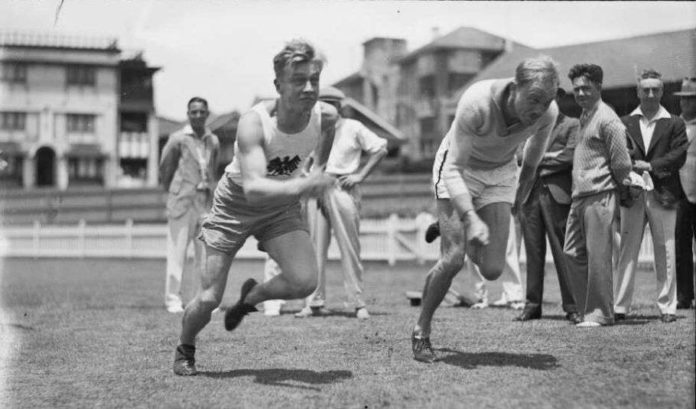On September 3, 1930, German sporting officials agreed to allow Otto Peltzer to resume his amateur athletics career following argument over his earlier Australian tour. The now largely forgotten first known gay Olympian led many lives: sickly child, national sporting hero, concentration camp inmate and legendary pioneering coach of Indian athletics.
Images: National Library of Australia
After overcoming childhood illnesses to become a champion middle-distance runner, Otto Peltzer quickly became a star of international athletics. In three years in the mid-twenties, he broke two world records and set another. He held the 800-metre and the 1500-metre world records simultaneously, a feat only repeated by Sebastian Coe 50 years later. He was popular with crowds and with athletes, elected captain of the German Olympics team in 1928 and 1932.
But German athletics officials never liked him. He was outspoken on behalf of his fellow athletes, saying exactly what he thought and consequences be buggered.
“To whom does German sport owe the rise of its athletes? Not the sport’s functionaries, but the young leaders and coaches in the clubs, who do it for nothing.
“Yet the big-time officials puff themselves up as if it’s down to them that we’ve caught up with the best in the world again.”
They would never forget his insolence, nor something else he made little attempt to hide — what they called his ‘Hellenic inclinations’ — his homosexuality.
Offered a small fortune to compete professionally, Otto declined.
“I want to run in the Olympic Games. And I’ll always remain amateur.”
Peltzer survived on his income as a teacher and coach but while successful, some of his methods raised eyebrows. He believed in the benefits of nude sunbathing, among other things. He once reminisced about leading groups of young athletes in runs across a snowy plateau and then down a hill to a valley where he had them roll around naked in the melting snow. Apparently, it helped their athletic prowess.
Australia
In 1930, Otto toured Australia, running in exhibition races and coaching local athletes. He arranged for two of his young proteges to join him on the tour. Leo Lermond, 24, was a champion American athlete while 17-year-old Gerhardt Emton (both pictured above with Otto) was a student of Otto’s back in Germany. Except his name wasn’t Emton. It was Obermüller.

 Gerhardt Emton and Otto Peltzer in an exhibition race in Australia
Gerhardt Emton and Otto Peltzer in an exhibition race in AustraliaOtto never bothered to apply for the necessary permissions for Gerhardt to compete overseas so he simply gave Australian sporting authorities a false name for the lad. The name he chose, Emton, meant basically Joe Bloggs.
When Otto Peltzer’s enemies in the German sporting bureaucracy learned of the subterfuge, they saw their chance for payback. They stripped him of his amateur status for a while but with the 1932 Olympics approaching, they relented before things became too serious.
However, when the Nazis came to power, and certainly after the Night of the Long Knives and the subsequent crackdown on queer Germans, Otto Peltzer’s openness about his sexuality put him in legal jeopardy.
Prison
In 1935, authorities charged him with ‘homosexual offences with youths’. International sporting stardom provided no protection from the Nazis as tennis champion Baron Gottfried von Cramm would later discover.
Sentenced to 18 months imprisonment, Otto gained early release after promising to end his involvement with sports. Caught coaching, he was returned to prison in 1937.
In German prisons of the era, gay prisoners had an A on their uniforms, the first initial of the German word for ‘arse-f_cker’, later replaced in the concentration camps by the pink triangle.
On his release, he fled Germany but after ending up homeless in Sweden, returned in 1941. The Nazis promised to drop all charges against him if he returned. But they lied.
They sent him to KZ Mauthausen, later better known as Mordhausen, the ‘Murder Houses’.
Otto believed he was in the camp for three months for ‘re-education’. However, the camp officers were amused to hear that.
“You’ll be out in less, probably,” the camp commandant told him, and pointed to a chimney. “There’s the way out of this camp.”
Otto Peltzer survived his internment but remained in the camp until it was liberated in 1945.
Because of his conviction for homosexuality, he struggled to find employment after the war.
He eventually moved to India where he lived in a shack in the national athletics stadium in New Delhi and coached young Indian athletes. He survived on bread and soup his students brought him from home. Any money he earned from coaching, he donated to local charities.
Even in India, his battles with officialdom continued with Peltzer as the ultimate outsider insisting on equal opportunity for all. Despite the opposition of Indian sporting officials, he insisted on coaching street children as well as the more advantaged.
Forced by ill health to return to Germany in 1967, Otto Peltzer died of a heart attack as he left an athletics meet.
For the latest lesbian, gay, bisexual, transgender, intersex and queer (LGBTIQ) news in Australia, visit qnews.com.au. Check out our latest magazines or find us on Facebook, Twitter, Instagram and YouTube.








